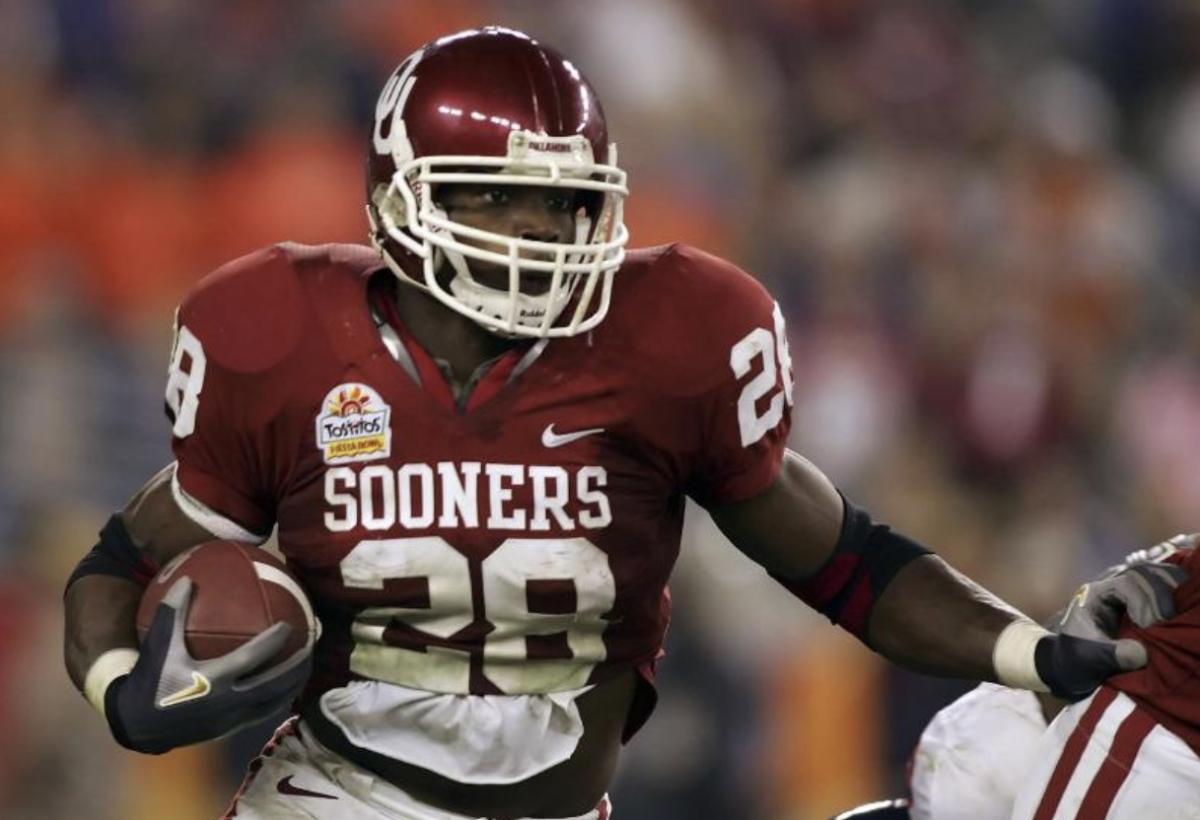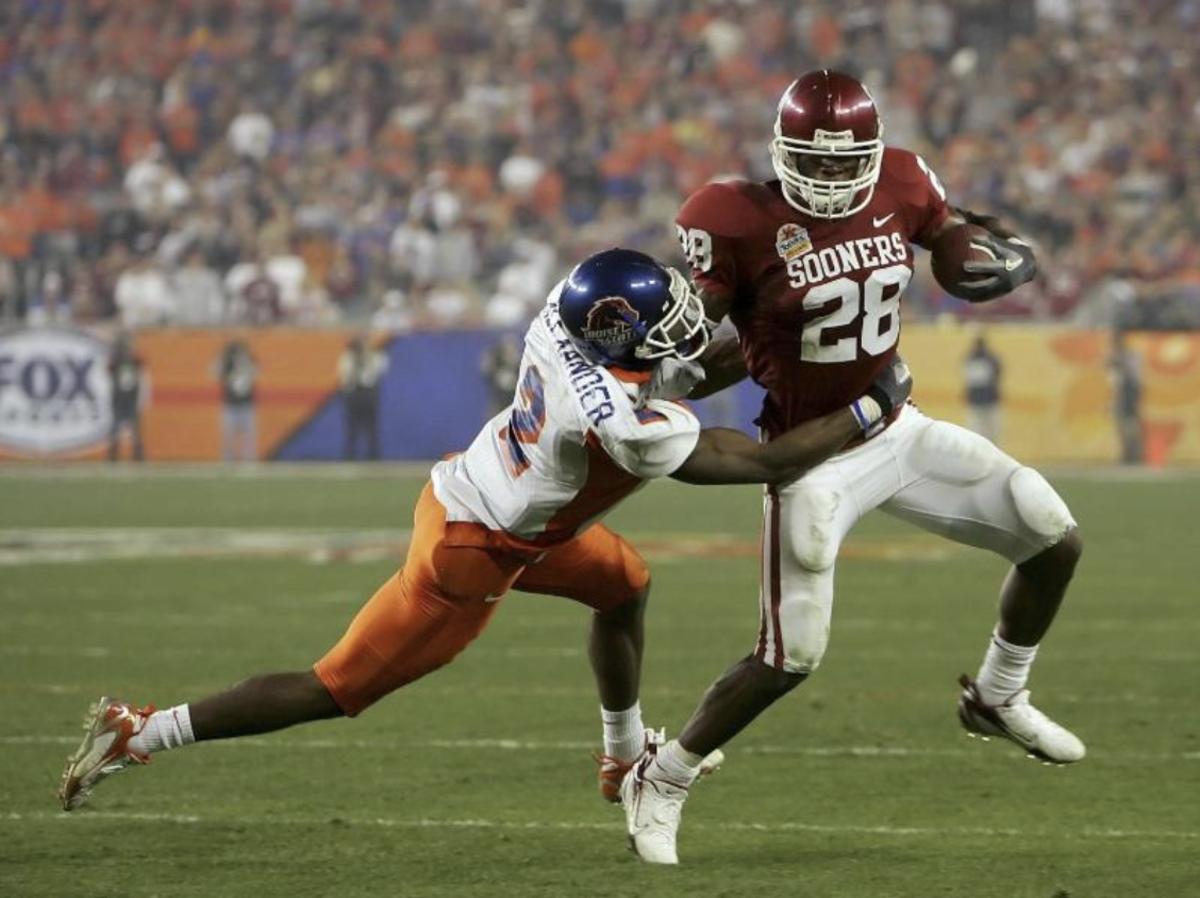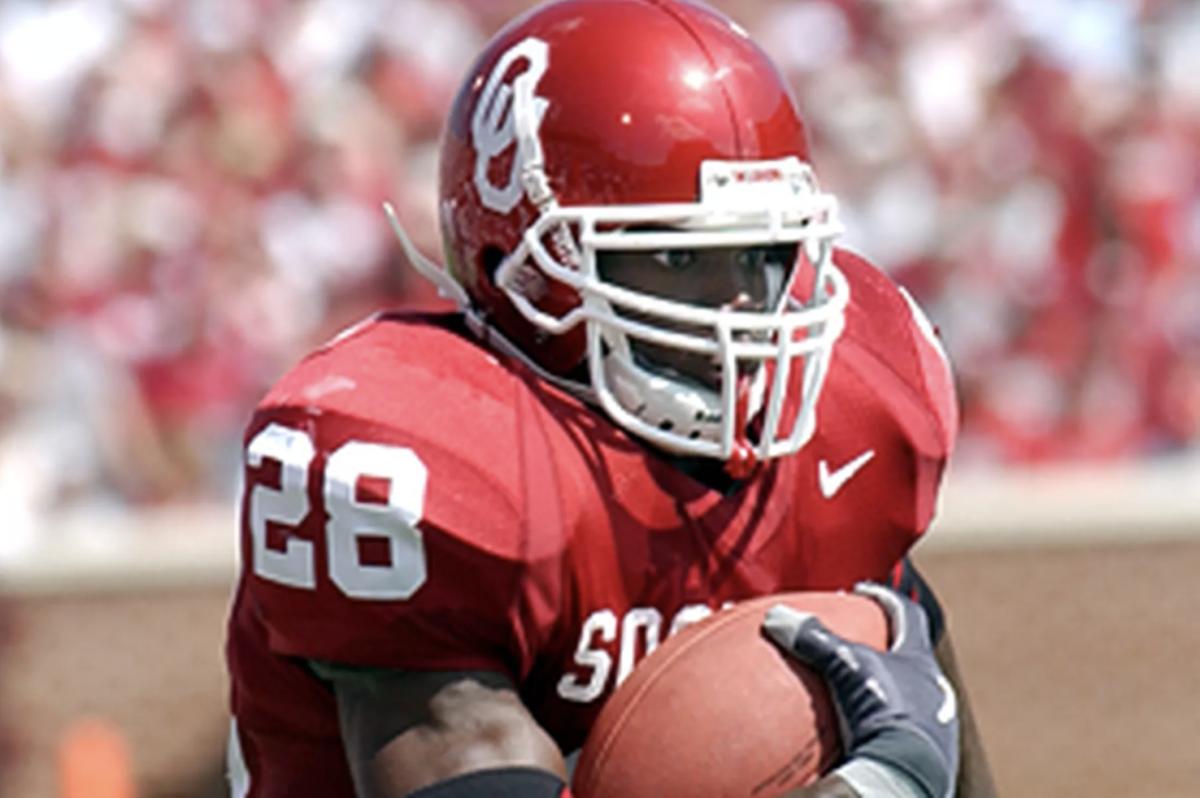Top 25 Players in Big 12 History, No. 1: Adrian Peterson Longs for His Days at Oklahoma
As the Big 12 Conference ramps up its 25th football season, it’s a good time to look back through the league’s illustrious history and identify the best football players ever to suit up.
It was a daunting task to rank players from 14 schools over 24 seasons. Some schools, of course, didn’t participate in all 24 years.
Rather than select an all-time All-Big 12 team — we’ll endeavor to pull that off after the 25th season has concluded — publishers from SI affiliates who currently cover the Big 12 were asked to vote on their top 25 players.
Players were judged on both their college careers and their professional football exploits. National awards, championships and individual achievement were all considered.
In all, nearly 50 players received votes. Only 10 players were unanimous selections.
With that, the countdown with No. 1 — the greatest player in the history of the Big 12 Conference:
- - - - -
Even before Friday’s news that he was no longer on an NFL roster — for the time being — just like the rest of us, Adrian Peterson longs for his college days.

One of the most decorated and accomplished players in professional football history thinks all the time about being a Sooner.
“Man, I do. I really do,” Peterson recently told SI Sooners. “I honestly do.”
Peterson’s longing goes beyond the normal “good old days” stuff. He’s talking about football immortality. Maybe other sports, too.
“You never know what could happen,” he said, “but I think about, man, what would have happened if I would have come back and played my senior year? Maybe I would have finally won my Heisman Trophy. You know?”
The Heisman that should have been his in 2004, when, as a freshman, he was the most outstanding player in the country. Or the Heisman that could have been his in 2006, if he hadn’t been injured at midseason by diving into the end zone and shattering his collarbone against Iowa State.

Peterson joined De’Mond Parker as the only Sooners to surpass 1,000 yards three times. But he barely cleared the bar his sophomore and junior seasons, running for 1,104 yards in 2005 and 1,012 yards in 2006.
“My junior year, just how good that season was going for me and for us as a team,” he said. “I had 1,000 yards in seven games. I was up in the Heisman Trophy talks again. Just a stupid dive. I could have just run through. Pretty much ended my career there, outside of the Fiesta Bowl that I played in — where I actually rebroke my collarbone, a lot of people don’t know.”
Peterson finished his college career with 4,045 rushing yards, good for third in school history behind Billy Sims (4,118) and Joe Washington (4,071). Samaje Perine since moved the record to 4,118. But had Peterson played another season? Or if he had just been healthy during his last two? Could he have chased 6,000?
Maybe.

Peterson played in 13 games as a freshman and just eight as a junior. His sophomore season was limited by a high ankle sprain, so he was at full strength for just eight games that year, too (in a four-game midseason stretch, he only carried 16 times for 57 yards).
He was released by the Washington Football Club on Friday and proclaimed he would soon be on another team. Seems likely.
In 13 NFL seasons, Peterson, now 35, has played in 164 games and carried the football 3,036 times. He’s also caught 289 passes. His rushing total of 14,216 yards ranks fifth in NFL history, and his 16,997 all-purpose yards ranks 19th all-time. He’s rushed for 111 touchdowns (fourth all-time), owns three NFL rushing titles and is one of just seven men to surpass 2,000 yards in an NFL season.
But like everyone else, Peterson sometimes wishes he could go back to his college days.
“When I think about it, man, I really didn’t play a lot of college ball,” he said. “You know? When you do the numbers on how many games I played and time I played, I really didn’t play that much. So I do think about some of the things I could have fulfilled if I would have stayed healthy, one, and then coming back my senior year, the things I could have accomplished, the record books – winning the Heisman, obviously winning a championship. So I reminisce on that a lot.”
That fateful dive into the end zone against the Cyclones, at the end of one of his more spectacular runs, caused a pain that lingers well beyond a broken clavicle.
“That was the first game my dad was at out of prison, out of the feds,” Peterson said. “I could have just ran it in the end zone, and who knows? I could have went for 250 that game. It was just totally different. So I think about that, that year.”
Peterson also looks back with regret on his freshman year. The Sooners went 11-0 and crushed Colorado in the Big 12 Championship Game, then, rather than winning a national championship, got blown out 55-19 by USC in the Orange Bowl.
A month before the game, Peterson was runner-up to USC quarterback Matt Leinart for the Heisman.
After leading the NCAA with 1,925 yards, setting an all-time record for rushing yards by a freshman and scoring 15 touchdowns, Peterson thought at the time that Heisman should have gone to him.
He still does.
“Without a doubt. I do,” he said. “I didn’t understand how I didn’t win it.
“Matt Leinart had a great season. (Reggie) Bush had a great season. Jason (White, OU’s 2003 winner). (Utah quarterback) Alex Smith as well. I feel like what I was able to accomplish coming straight out of high school – straight out of high school – what I was able to accomplish, (75) yards short of 2,000, helping my team win the Big 12 championship, playing in the national championship, I think that was the year I had (nine) straight games over 100 yards.
“I don’t understand how you don’t give that trophy to a freshman. Well, I understand now because I know the politics behind it. But when you look at it logically, you say, ‘OK, it doesn’t matter if this guy’s a junior or this guy’s a senior, you know, who was the best, most electrifying player in college football this year?’ And you’ve got a rookie in that category who put up those numbers? You gotta give it to him.
“But back then, of course, it wasn’t the thing. It was seniors and juniors. That’s why I was like, ‘OK, man, is this award for what you’ve done over that year? So they give it out every year? Or is it a career award?’ You know what I’m saying? So to me, the lines were blurred after I lost the Heisman Trophy. The highest finish for a freshman? And you don’t give it to me? But you know, you give it to Matt Leinart. He had a decent year. He was a junior that year. You give it to this guy … I didn’t understand that then. But they ended up giving it to him.”
Simply put, the way voters think about the award has changed. In 2007, Tim Tebow became the first sophomore to win the Heisman. In 2008, Sam Bradford became the second. And in 2012, after redshirting 2011, Johnny Manziel became the first freshman to win it. Jameis Winston also won it as a redshirt freshman.
Leinart did have a great 2004 season. But if that year was projected 16 years into the future, Peterson would most likely win now.
“But you know what’s more mind-blowing than the Heisman Trophy?” Peterson asks. “The fact that me and Reggie Bush were the only two running backs up for the Heisman Trophy — so the Heisman Trophy represents the best player in college football, right? Right? OK. So how did – God rest his soul – Cedric Benson win the Doak Walker Award?
“Here I am up at the Heisman Trophy ceremony and there are guys that are not up for the Heisman, and one of them wins the Doak Walker Award (as college football’s best running back). How’s that make sense? How is all this adding up? I finish second in the Heisman Trophy voting, but then I don’t win the Doak Walker Award. Then, when I did my research, OK, obviously Doak Walker, he played in Texas (at SMU), here I am again, a freshman, Cedric Benson was a senior (at Texas), and they give it to this guy.
“So I’m like, ‘You know what? Screw these awards. They don’t mean nothing.’ You know what? My freshman year, I won the Heisman Trophy and the Doak Walker Award that year – in my mind. I don’t have to have the trophy. I go by the numbers and what I was able to do that year.”

Believe it or not, Peterson isn’t necessarily fixated on football trophies. While he would have enjoyed taking them home, he also has a tinge of regret about playing just one sport at OU.
“I also reminisce on not running track while I was there,” he said. “Being a two-sport athlete.”
Hey, AD is short for All Day. Why stop at two?
“Now that I’m older and wiser and I see things through a different lens, I’m like, ‘Man, I should have tried out for the baseball team, too,’ ” Peterson said. “Shoot, I wish I would have had the mindset I had after a couple years in the NFL. Like now. Man, I would have done things totally different.
“Yeah. I left a lot there, I can tell you that.”
The Top 25
- No. 1: Adrian Peterson
- No. 2 (tie) Vince Young, Ndamukong Suh
- No. 4: Ricky Williams
- No. 5: Baker Mayfield
- No. 6: Michael Crabtree
- No. 7: Darren Sproles
- No. 8: Derrick Johnson
- No. 9: Dat Nguyen
- No. 10: Roy Williams
- No. 11: Kyler Murray
- No. 12: Grant Wistrom
- No. 13: Von Miller
- No. 14 (tie): Justin Blackmon, Tommie Harris
- No. 16: Terence Newman
- No. 17: Jeremy Maclin
- No. 18-21 (tie): Sam Bradford, Ryan Broyles, CeeDee Lamb, DeMarco Murray
- No. 22-23 (tie): Rashaun Woods, Earl Thomas
- No. 24: Tavon Austin
- No. 25 (tie): Robert Griffin III, Patrick Mahomes & Jason White
To get the latest OU posts as they happen, join the SI Sooners Community by clicking “Follow” at the top right corner of the page (mobile users can click the notifications bell icon), and follow SI Sooners on Twitter @All_Sooners.
